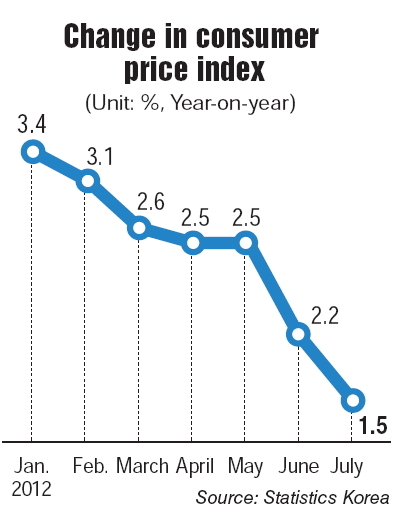Korea’s consumer prices grew at the slowest pace in 12 years in July as the slowing global economy drove down costs of crude oil and other products by cutting overall demand, a report showed Wednesday.
The country’s consumer price index rose 1.5 percent in July from a year earlier, compared with a 2.2 percent on-year gain the previous month, according to the report by Statistics Korea.
July’s reading marks the slowest growth since May 2000 when consumer prices gained 1.1 percent. It also marks the first time in three years that inflation has fallen into the 1 percent range.
The core inflation, which excludes volatile oil and food prices, grew at 1.2 percent from the same month last year, which also decelerated from a 1.5 percent increase in June, the report showed.

“Falling oil prices resulted in cutting the overall costs of manufactured products. Agricultural and fishery products also saw less-than-expected price hikes, which helped ease inflationary pressure last month,” said Jun Min-kyoo, an economist at Korea Investment & Securities.
The report showed that factory product prices dropped 1 percent from a month earlier. Agricultural, fishery and livestock prices posted a 1.6 percent on-month decline.
High crude prices had long hampered the government efforts to keep inflation under control here as the country depends on imports for most of its energy needs. But the oil prices are recently falling, helping lower the production costs of many factory products.
In addition, farming goods have been expected to put heavy upward pressure on food prices amid worries that harvests of some crops could be hurt by drought, which hit domestic and overseas farming lands.
Market watchers say that a slowing global economy and resulting less-than-expected demand seem to be playing a role in reducing the overall price hikes.
Sluggish global demand caused South Korea to post a contraction of exports last month, raising worries about the outlooks of its trade-dependent economic growth.
The trade ministry earlier announced that the country’s exports dropped 8.8 percent on-year to $44.6 billion last month.
The latest inflation figures and dismal export data could provide more leeway for policymakers to employ measures aimed at boosting the economy. They could include an additional rate cut by the central bank.
“Easing price hikes coupled with less-than-expected exports will give more room for the central bank to consider a rate reduction sooner or later,” said Jun of Korea Investment & Securities.
Last month, the Bank of Korea cut its key interest rate to 3 percent for the first time in more than three years, underscoring its urgency to cushion the bitter impact of the eurozone debt crisis on the local economy.
(Yonhap News)







![[Weekender] Korea's traditional sauce culture gains global recognition](http://res.heraldm.com/phpwas/restmb_idxmake.php?idx=644&simg=/content/image/2024/11/21/20241121050153_0.jpg)
